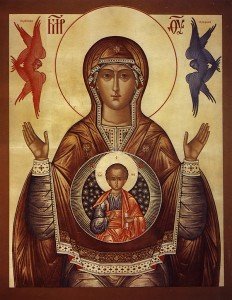In order to maintain a fully balanced view of Byzantine Mariology (beliefs about Mary, the Mother of God), it is necessary to keep in mind the Christological framework of the veneration of Mary in Byzantium. The absence of any formal doctrinal definition on Mariology allowed poets, orators and writers of liturgical texts the freedom to formulate an abundance of prayers to Mary. They also always had available in hundreds of copies the writings of the greatest of all Byzantine patristic authorities, Chrysostom, who found it possible to ascribe to Mary not only “original sin,” but also “agitation,” “trouble,” and, even, “love of honor.” No one, of course, would have dared to accuse the great Chrysostom of impiety. So the Byzantine Church, wisely preserving a scale of theological values which always gave precedence to the basic fundamental truths of the Gospel, abstained from enforcing any dogmatic formulation concerning Mary, except that she was truly and really the Mother of God, a term and concept that came from one of the first Ecumenical Councils. No doubt, this striking title, made necessary by the logic of Cyrillian Christology (St Cyrill of Alexandria), justified her daily liturgical acclamation as “more honorable than the Cherubim, and more glorious beyond compare than the Seraphim”.
 What greater honor could be rendered to a human being? This is why we, to this day, only address Mary with this one title, Mother of God.
What greater honor could be rendered to a human being? This is why we, to this day, only address Mary with this one title, Mother of God.
We see that in the Western Church there has been a proliferation of titles given to the Mother of God. In the Eastern Church there has been descriptors give to Mary, such as greater than the Seraphim, but she has never been given a title other than the Mother of God.
The Eastern Church does believe that the Virgin Mary is an image, as St. Maximos the Confessor says, of the Christian goal of becoming Christ-like, of theosis. Just as the Theotokos gave birth to Christ in a bodily way, so we must, St. Maximos tells us, give birth to Christ in an unbodily or spiritual way. In so doing, we imitate her practical spiritual life, including the purity and humility by which she formed her free will into perfect obedience to the Will of God.
Mary is, perhaps, the most important model we have of what it truly means to be the type of human being God intended when he created humanity. It is important that we don’t rob her of her humanity. If we do, she no longer is a model that we can imitate. Just as the Church found it very important to assert that Jesus was truly a human person, so too the Eastern Church finds it important that we don’t make Mary so different from us that we cannot use her as a model of how we should live. Like her, let us say yes to God’s will.
